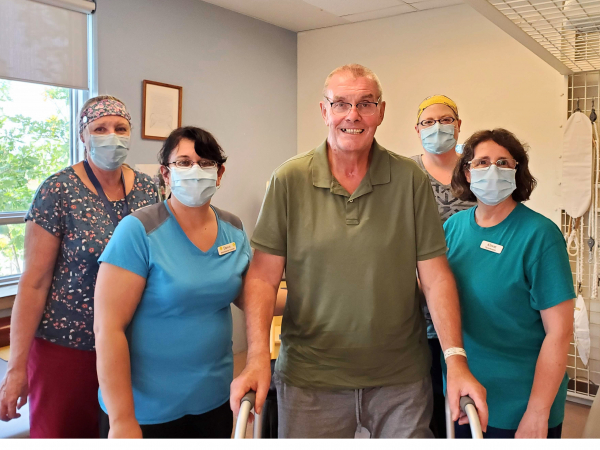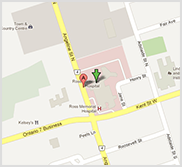An international journey and incredible recovery

Photo, left to right: Lorna Bogar, Occupational Therapist; Dawn McNeil, Rehab Assistant; Neil Pearson; Ange Allard, Rehab Assistant; Alison Rees, Physiotherapist.
In February 2020, the current pandemic had not yet hit close to home, and Neil Pearson and his wife, Ellen, took their annual trip to France to visit their daughter. As they were enjoying their holiday, Neil developed what he felt was a sinus infection, but was able to manage with rest and medication. As their return date approached, Neil noticed weakness and an inability to grip objects with his hands. On the morning of their return flight to Canada – March 17, Neil awoke and was unable to get out of bed. “I had no balance, no coordination,” Neil recalled, “I was immediately taken to the hospital by paramedics, where tests were performed.” This was the last thing Neil remembered before waking up in Canada a month later.
Admitted to the Intensive Care Unit in a hospital in France, Neil was placed in a medically induced coma. He was diagnosed with Guillain-Barré Syndrome (GBS), a rare condition in which a person's immune system attacks the peripheral nerves. The disorder usually appears in the days or weeks following an infection. “I’m the 1 in 100,000 that got this after a viral infection. My body’s immune system went rogue, and mistakenly attacked my nervous system,” says Neil, “It’s something I wouldn’t wish on my worst enemy.”
Meanwhile, Ellen was unable to visit Neil due to the pandemic restrictions, but she was able to stay in touch with his care team in France. Her first glimpse of her husband was April 7, when they were able to secure a repatriation flight by air ambulance from France to Iceland, then from Iceland to Toronto. Ellen shared that her husband appeared to be a shell of his former self, and she was so grateful to be next to him for the journey back to Canada. “I woke up in the ICU in Peterborough,” Neil recalled, “and all I could hear was ‘He’s going down. Keep breathing. Keep breathing. He’s going down.’”
Most people recover from GBS and while Neil had a particularly devastating case of the syndrome, he did slowly start to regain his functioning. He was transferred closer to home to Ross Memorial Hospital on May 13, where at first, he could only move his toes very slightly. His leg movement began to return, followed by his left hand, and eventually, movement returned throughout his body. More than the physical limitations, Neil says that the most frustrating part of his journey was his inability to communicate. “I couldn’t speak, I couldn’t even swallow. When I tried to ask someone to get me a drink, or to scratch my nose, it was impossible.”
Neil credits his dedicated team of nurses, Physiotherapist Alison Rees, Occupational Therapist Lorna Bogar, Rehab Assistants Dawn McNeil and Ange Allard, and his Speech Pathologist Alison Mack, with restoring his physical functioning, and supporting him emotionally through this time. He noted that Alison Mack, Speech Pathologist “was a rock. She helped me learn how to swallow again, so I could start drinking and eating a bit, and I was finally able to communicate – the progress there has been fantastic.”
Today, Neil is at home continuing his recovery. No matter how low some of his moments were, Neil says that he always knew there was a light at the end of the tunnel. “I would say that 50 per cent of my recovery has been having a positive mental attitude,” Neil shared. “The other 50 per cent is certainly credited to the doctors, nurses and rehab specialists.”
When asked about his experience at Ross Memorial Hospital, Neil reflected, “The specialists I needed are here. The equipment I needed to recover is here. Everything I needed to get back to myself is here. It’s just wonderful.”
Neil is also on the RMH Auxiliary Board of Directors and hopes to return to his volunteer duties as the pandemic and his recovery allows.
@RossMemorialHospital
Follow us and stay up to date on news, events and health related issues:


